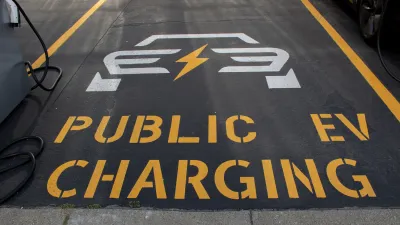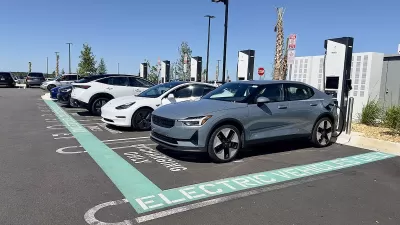The proliferation of private EV charging services, coupled with federal investment in charging stations, has the potential to reduce 'charging anxiety' and encourage a faster switch to electric vehicles.

The rise of electric vehicle charging programs known as 'EV Charging As A Service' could help speed up EV adoption and build out the nation's network of charging stations, writes Steve Tengler in Forbes. The growth of a private charging industry alongside government-funded charging stations could ease "charging anxiety" experienced by drivers considering making the switch from gas-powered vehicles and businesses seeking to electrify their fleets. "Regardless of potential fuel savings, businesses cannot have valuable assets either experiencing downtime or non-productive mileage," Tengler says.
The concept is that such services provide lower risk solutions with greater flexibility to small- and mid-sized businesses or multifamily properties, especially where multiple vehicles need charging. The Charging As A Service program removes the burden of ownership and maintenance from the charging host by providing such things as turnkey EV charging stations, management software, 24/7 driver support, professional field maintenance, etc.
As Tengler notes, "Any rollout plan for a technology shift requires some early adoption from the market segments with the greatest need, which in turn reduces the price point or impediment to widespread adoption."
FULL STORY: ‘Charging As A Service’ For Electric Vehicles Growing As A Market Offering

Planetizen Federal Action Tracker
A weekly monitor of how Trump’s orders and actions are impacting planners and planning in America.

Maui's Vacation Rental Debate Turns Ugly
Verbal attacks, misinformation campaigns and fistfights plague a high-stakes debate to convert thousands of vacation rentals into long-term housing.

San Francisco Suspends Traffic Calming Amidst Record Deaths
Citing “a challenging fiscal landscape,” the city will cease the program on the heels of 42 traffic deaths, including 24 pedestrians.

Defunct Pittsburgh Power Plant to Become Residential Tower
A decommissioned steam heat plant will be redeveloped into almost 100 affordable housing units.

Trump Prompts Restructuring of Transportation Research Board in “Unprecedented Overreach”
The TRB has eliminated more than half of its committees including those focused on climate, equity, and cities.

Amtrak Rolls Out New Orleans to Alabama “Mardi Gras” Train
The new service will operate morning and evening departures between Mobile and New Orleans.
Urban Design for Planners 1: Software Tools
This six-course series explores essential urban design concepts using open source software and equips planners with the tools they need to participate fully in the urban design process.
Planning for Universal Design
Learn the tools for implementing Universal Design in planning regulations.
Heyer Gruel & Associates PA
JM Goldson LLC
Custer County Colorado
City of Camden Redevelopment Agency
City of Astoria
Transportation Research & Education Center (TREC) at Portland State University
Jefferson Parish Government
Camden Redevelopment Agency
City of Claremont





























